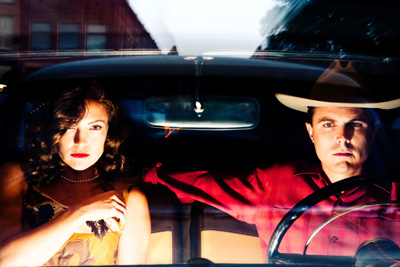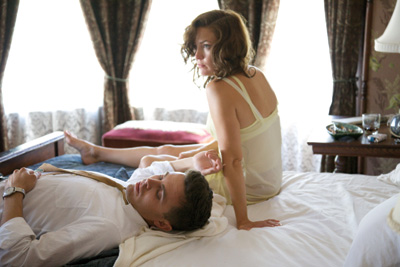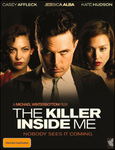Michael Winterbottom The Killer Inside Me

THE KILLER INSIDE ME
Starring: Casey Affleck, Kate Hudson, Jessica Alba, Simon BakerDirector: Michael Winterbottom
Run time: 108 minutes
Synopsis: Based on the novel by legendary pulp writer Jim Thompson, Michael Winterbottom's THE KILLER INSIDE ME tells the story of handsome, charming, unassuming small town sheriff's deputy Lou Ford.
Lou has a bunch of problems. Woman problems. Law enforcement problems. An ever-growing pile of murder victims in his west Texas jurisdiction. And the fact he's a sadist, a psychopath, a killer. Suspicion begins to fall on Lou, and it's only a matter of time before he runs out of alibis. But in Thompson's savage, bleak, blacker than noir universe nothing is ever what it seems, and it turns out that the investigators pursuing him might have a secret of their own.
The Killer Inside Me
In Cinemas August 26
www.killerinsideme.com
MICHAEL WINTERBOTTOM INTERVIEW
Question: The project has been around for quite a while. How did it end up in your hands?Michael Winterbottom: I read the book and I really liked it. So I tried to find out who had the rights and realized that Chris Hanley from Muse Films and Bradford Schlei were the ones I had to contact. I met up with them in London and managed to persuade Chris to let me do it.
Question: Can you quickly sum up the story for people who don't know about the project?
Michael Winterbottom: It's based on the novel THE KILLER INSIDE ME by Jim Thompson. It is a great book, a very short, fast read. After the first ten pages the story's already kicked in. It has a classic noir feeling: a deputy sheriff in a small town in Texas meets a woman, and being in love with her or having sex with her triggers various repressed memories from his childhood. From that point on, he's on a journey of revenge and violence, really.
Question: Stanley Kubrick said about the book: "Probably the most chilling and believable first-person story of a criminally warped mind I have ever encountered." The project takes a deep look into the psyche of a killer who is calm and cool on the outside and brutal on the inside. How did you submerge yourself in the mind of this killer?
Michael Winterbottom: You can psychoanalyze the story a lot. In the middle of the novel there are a few pages that explain the character psychologically. Lou is a victim because his father abused him, and Jim Thompson has an almost straightforward explanation of how his father castrated him and how this sexual violence and abuse by the father was kind of being passed down. I think those medical or psychological explanations are fine, but to be honest, that's not really what interests me in the book, which is almost like a Shakespearean tragedy, really. You have these incredible passions and a very theatrical story. In the middle of the book there's a story within the story where Lou Ford tells you the whole book. He tells a story about a guy who is happily married and has children. Then he meets this woman and has this affair and he falls in love with his new girlfriend. One day they flee together and the police find that he's murdered all the family and the girlfriend. Lou Ford says something along the lines of: How do you understand this sort of thing? People do these things; people destroy their lives. How do you understand that? So the interesting aspect for me is more the idea that Thompson is portraying this world where people destroy things, and you don't want to explain it psychologically. Because this is just what happens, this is just what it is like. People fuck up, people destroy their lives, people, for whatever reason, are destructive. He captures something true about the world. You don't need to try to explain it; you just need to show that it's true.
 Question: Lou is an antihero, but we develop sympathy for his character. Can you explain that?
Question: Lou is an antihero, but we develop sympathy for his character. Can you explain that?Michael Winterbottom: It is often the case that people who do violent things are interesting. Lou is a victim as much as an abuser; he has been formed by his childhood and by his father. It's what made him the man he is. The shorthand is a very crude thing. A simple explanation is never enough; it is just one way of formalizing it. The fascination is that you see this character Lou who does perverse things, who destroys people who seem to love him and whom he seems to love and could be happy with. This potential for love seems to trigger the desire to kill them, to destroy them. I guess a lot of people could recognize something like that in themselves. Everybody does things that are self-destructive to a greater or less degree. Lou is a very extreme version of what you see around you in real life.
Question: Why did you cast Casey Affleck as your lead?
Michael Winterbottom: The book is told in the first person, from the perspective of Lou Ford, the deputy sheriff with the killer inside him. So the whole film is constructed around this one character. You're with Lou Ford all the way through this trip. He's in every scene.
You get what he's doing and also you get his perspective on it, you get his interior world and what he is actually doing in the real world. So I wanted an actor who was able to somehow convey the sense that what's going on inside his head is not necessarily the same as what he's doing. I want the audience to get a sense that Lou Ford's interior world is at odds with how he behaves. Lou is this character who pretends to be something he isn't and interacts with people almost like a game. He thinks about things very self-consciously. So I was looking for an actor who was able to give you some sense of a complex and interesting world inside his head and I think Casey is a brilliant actor and was ready to do that.
Question: Jessica Alba is known for having declined hooker roles and other projects involving nudity. Why did she say yes to you?
Michael Winterbottom: I don't know! (laughs). But there is not really any nudity in the film exactly. Joyce is the person who he meets at the very beginning of the film, and the trigger of the whole story. She unlocks his repressed childhood memories. He falls in love with her in a way, the sex, the violence between them transforms him, and it's what motivates the whole story. Men and women in the book is that even though Joyce is the prostitute, the "bad girl", she is also really in love with Lou and wants to marry him. It's also true of Amy, the girl next door, the "good girl" - who is passionately in love with Lou and wants to have sex with him, violent sex. So you have a sense of the relationships between Joyce and Lou and Amy having a lot in common, rather than the traditional "good girl" / "bad girl" scenario. Actually both women have complex contradictory desires. Both of them want to have Lou in a genuine way. Both are in love with Lou in a very complete way.You quite often shoot with amateurs or semi-professional actors. How did you find working with A-list stars like Casey Affleck, Jessica Alba and Kate Hudson?It's the same. In this case the difference is not so much if the actors are famous or not, but that the script is quite formal. Most of the dialogue is taken directly from the book. It operates almost in a staged way. So the story unfolds through these quite long, formal dialogue scenes. In a case like this, you need actors good enough to pull that off. To be honest, people like Casey are brilliant.
But that's the difference, not whether Casey is famous or not famous.
 Question: Why did you cast Kate Hudson as Lou's girlfriend?
Question: Why did you cast Kate Hudson as Lou's girlfriend?Michael Winterbottom: We were incredibly lucky with all the cast, we had great people around us. Kate is a great actress and a lovely person. She also already knew Casey, which was good. We were basically just looking for the best people for the parts. Amy has a strange position in the story, because Lou is in a relationship with her, he grew up with her. She's the girl next door, and there's a part of Lou that finds her incredibly annoying and frustrating because she is so close to him. It's his own self-loathing that he projects onto Amy. At the same time, you feel that once he decides to kill her, he sort of relaxes. You realize that he is sort of in love with Amy: Amy could make him happy. What I love about Thompson's depiction of the relations between
Question: The book was written in 1952. In 1976, director Burt Kennedy made a movie out of it. In what way is your film different from the old version?
Michael Winterbottom: I haven't seen that version. When I read the book originally I didn't know it had been filmed; Chris Hanley told me. I think he said that he hadn't seen it either, to be honest. My original interest was t make a film with the book and not a remake of a film. I wanted to get my inspiration as directly as possible from the book. So I haven't watched that film.
Question: The project is a dark, twisted tale, but written in a very funny and amusing way. What feelings do you want to provoke with this story?
Michael Winterbottom: I don't like films that manipulate and make everyone feel everything exactly the same at the same time. What Thompson is brilliant at is telling a story, setting a pace and creating enjoyable moments and characters. I hope the film has got all of that, but I hope as well that is has got a complexity that will cause different people to have different feelings about Lou Ford. Lou is a killer - but the people in the story love him as well. One of the great things about the book is that even the people he kills are capable of loving him even when they mistrust him. So he is an incredibly complex, interesting character in the book and I hope that's what we've achieved in the film.
Question: Historically, cinema has shown a real interest in stories about killers and psychopaths. How do you explain it?
Michael Winterbottom: These are dramatic stories. Murders and killers: this is the stuff of drama, not just cinema. It is an extreme version of the world. This story is dynamic, very extreme, full of sex and violence, the sort of staple things that attract people to plays, books or films... even newspapers are full of stories exactly like that. People are interested in lives that are an extreme version of their own. At the same time I think it's a very complex story emotionally. What you feel about Lou and his relation to Joyce and to Amy, it's a kind of mixed feeling, a feeling of waste, a possibility of love that is being wasted. It is a very lyrical story. It is not about the violence alone, it's about a potential beauty that's being destroyed.
Question: The project has an allure of a neo-noir psychological thriller. What is your definition?
Michael Winterbottom: I think noir films are great, noir books are great. I think what the noir genre gives and what the book reflects brilliantly is a great entertaining, dark, sexual, violent story which is incredibly enjoyable to read and hopefully enjoyable to watch. But at the same time there is something in it that connects to more ambitious and complicated ideas about what you feel about the world, what you feel about yourself, how you get along with other people, how people behave with each other, and how people can be destroyed or perverted by relationships and society. So this is a big ambitious, full-blooded template that captures something of life. And I guess that was the stimulation for me, that it's not simply about women and nasty violent men, but also a story that makes you think about the world and your own life.
Question: Is this story designed as straightforward entertainment or also a socio-critical comment?
Michael Winterbottom: No, I don't think it will be a socio-critical movie. You know Thompson is not about being political or social, but he shows you the underbelly of the world, the underbelly of America in the 50s specifically, the underbelly of how life is. It's a story you read in the newspapers and see on TV all the time: people whose lives are being broken in some way through violent acts caused by feeling of inadequacy or need. In Lou, he creates this character who feels self-loathing. Lou feels inadequate, very much in the shadow of his father, wanting to do things that he can't do. Lou kills the people who love him: the people who are closest to him are the ones he ends up killing. People who connect with him or trigger some possibility of helping him cause his most destructive behavior. In that sense you are showing a dark side of normal life. Also the town depicted in the book has a very interesting setting: it has a small-town Texas feel at its core, it is a typical western town where everyone is polite and very respectable on the surface. But suddenly there's been a boom, with a lot of people moving into the oil industry.There is a sense of commercialism that runs against the old town western values. People know that things are going on but as long you're polite it doesn't matter. So there are all sorts of detailed depictions of the exposing of hypocrisy and corruption. But I don't think that's really Thompson's interest, and it's not really mine. My focus is more on the individual, self-destructive nature of people whatever sort of society they're in.
Question: How important is it that the story is set in the 50s?
Michael Winterbottom: I don't know. It's not that long ago, let's face it. I think small town life is not necessarily so different than it was back then. I really don't think it's that important that it's set in the 50s. It makes it harder to film! (laughs) The book is very fictional; it creates this world that's parallel to the real world, a world inside Lou's head. Do people normally behave like that? It's not a normal world; it's a strange world.
I guess maybe in some ways by being set in the 50s you feel it's easier to buy into that world. But it wasn't what appealed to me about the story. For me it was more about the story of this character and the atmosphere: more than anything I was triggered by the atmosphere and the mood of the story.
Question: This is your first American production. Was that part of the attraction?
Michael Winterbottom: It ended up like that. I've made a lot of films in a lot of different places and for us it's just another film that we made abroad. As I said, originally we were trying to do a sort of gangster film in England and it didn't happen. And it was really when we were preparing for that that I read THE KILLER INSIDE ME and thought about making it. The idea of making a film noir set in America was fun, but it wasn't in any way the starting point.
Question: What makes THE KILLER INSIDE ME such a strong project?
Michael Winterbottom: When you read the book, you have a sense of the kind of tragedy, a sense of the possibility of love, the possibility of friendship, the possibility of something beautiful, which is totally destroyed by Lou. He is totally capable of allowing people to connect with him, but he's very isolated, very self-conscious and feels very inadequate. And yet people still love him. For me this thing that you are left with at the end of the book is what made me want to make the film.
The Killer Inside Me Interviews
Michael Winterbottom - www.femail.com.au\michael-winterbottom-the-killer-inside-me.htmKate Hudson - www.femail.com.au/jessica-alba-the-killer-inside-me.htm
Jessica Alba - www.femail.com.au/kate-hudson-the-killer-inside-me.htm
Casey Affleck - www.femail.com.au/casey-affleck-the-killer-inside-me.htm

BASED ON THE NOVEL
BY JIM THOMPSON
James Myers Thompson (1906 - 1977) was an American author and screenwriter, known for his pulp crime fiction.Thompson wrote more than thirty novels, the majority of which were original paperback publications by pulp fiction houses, from the late-1940s through mid-1950s. Despite some positive critical notice, notably from Anthony Boucher in The New York Times, he was little-recognized in his lifetime.
Only after death did Thompson's literary stature grow, when in the late 1 980s, several novels were re-published in the black LIZARD series of re-discovered crime fiction.
Thompson's writing culminated in a few of his best-regarded works: THE KILLER inside ME, savage NIGHT, A HELL OF A woman and pop. 1280. In these works, Thompson turned the derided pulp genre into literature and art, featuring unreliable narrators, odd structure, and surrealism.
During his tenure in Hollywood, he collaborated with Stanley Kubrick on paths OF GLORY and THE KILLING. His novel THE GETAWAY was adapted into the 1972 Sam Peckinpah film of the same name, starring Steve McQueen andAli MacGraw. His works saw eight subsequent screen adaptations including the James Foley- directed AFTER DARK, MY sweet and multiple Oscar-nominee THE GRIFTERS.
MORE
- Mission: Impossible Fallout
- Glenn Close The Wife
- Allison Chhorn Stanley's Mouth Interview
- Benicio Del Toro Sicario: Day of the Soldado
- Dame Judi Dench Tea With The Dames
- Sandra Bullock Ocean's 8
- Chris Pratt Jurassic World: Fallen Kingdom
- Claudia Sangiorgi Dalimore and Michelle Grace...
- Rachel McAdams Disobedience Interview
- Sebastián Lelio and Alessandro Nivola...
- Perri Cummings Trench Interview
Copyright © 2001 - Female.com.au, a Trillion.com Company - All rights reserved. 6-8 East Concourse, Beaumaris, Vic 3193, Australia.



